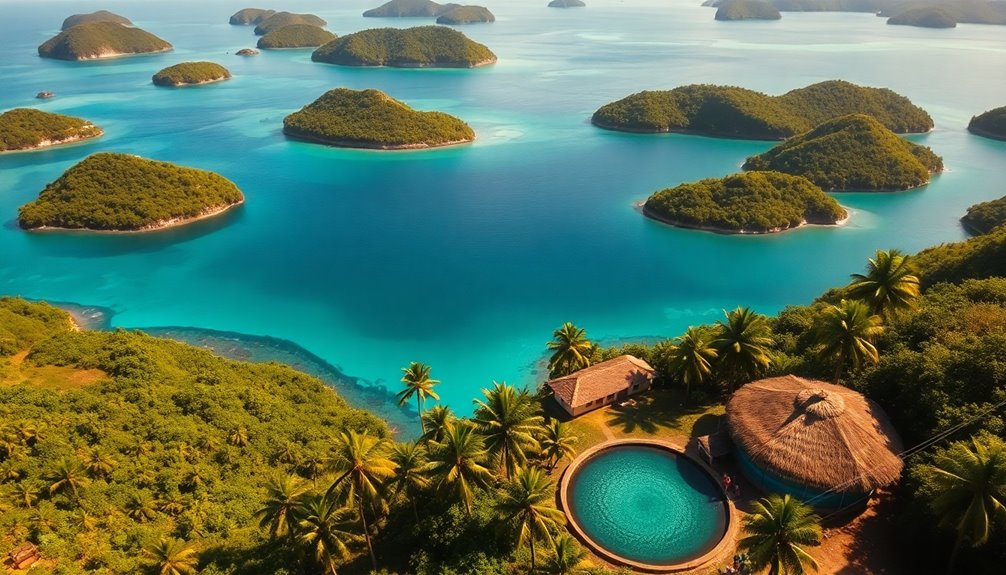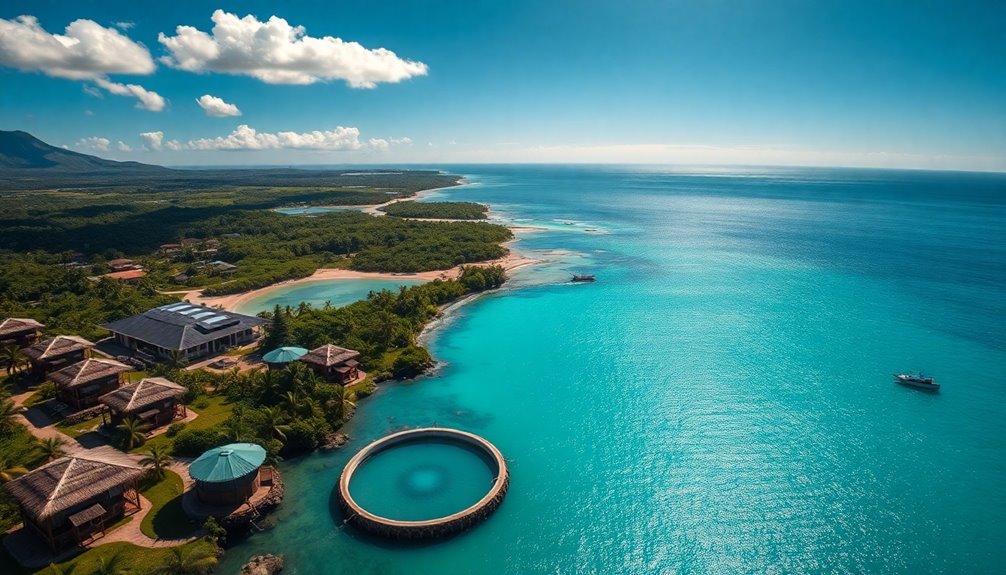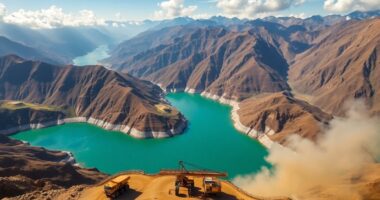Water security on Pacific Islands is deteriorating, and you can't ignore the urgent need for innovative solutions. Climate change has intensified droughts and saltwater intrusion, threatening already limited freshwater sources. Access to clean water is inadequate, especially in rural areas, leading to health threats like waterborne diseases. To tackle these issues, improved rainwater harvesting and sustainable management practices are essential. There's much more to explore regarding effective strategies to secure water for these vulnerable communities.
Key Takeaways
- Climate change exacerbates water security challenges on Pacific Islands, necessitating innovative solutions to ensure sustainable freshwater access.
- Improved rainwater harvesting techniques can significantly enhance water availability for communities facing limited groundwater sources.
- Sustainable water management practices are essential to mitigate risks of waterborne diseases and promote public health.
- Investment in reliable water infrastructure is critical to support agricultural productivity and local livelihoods, reducing economic vulnerability.
- Prioritizing access to clean water is vital for ecosystem health and resilience against climate variability impacts.

Water security on Pacific Islands is a pressing issue, especially as climate change intensifies its impact. You mightn't realize how limited groundwater sources are in low-lying atolls, which makes these islands heavily dependent on rainfall for their freshwater needs. This reliance can leave you vulnerable to droughts and climate variability, as surface freshwater sources are scarce. Saltwater intrusion becomes a constant threat due to rising sea levels, jeopardizing the already fragile water supply.
Access to clean water is another significant challenge. Only 55% of people in the Pacific Islands have basic drinking water access, and urban areas fare better than rural ones, with 92% compared to just 44%. The inadequate infrastructure often leads to contamination risks, and financial constraints hinder maintenance and expansion efforts.
Access to clean water remains a critical challenge, with only 55% of the Pacific Islands' population having basic drinking water access.
You may notice that these issues create a perfect storm for health problems, as limited access to clean water increases the risk of waterborne diseases like cholera and dysentery. The consequences of water scarcity extend beyond physical health, also affecting mental well-being through chronic stress and anxiety. Additionally, many communities lack sustainable water management systems that could help mitigate these risks.
The economic implications of water insecurity are vast. Agricultural productivity suffers when water shortages occur, leading to crop failures and heightened food insecurity. Relying on imported food due to local agricultural setbacks can put additional strain on the economy, making you feel the weight of vulnerability.
Local livelihoods, particularly those dependent on agriculture or fishing, hang in the balance, while tourism and industrial development face obstacles due to limited water resources.
Addressing water security on Pacific Islands demands a novel approach. Innovative solutions, including improved rainwater harvesting techniques and sustainable management practices, can make a difference. By prioritizing access to clean water and investing in reliable infrastructure, you can help safeguard not just human health but also the ecosystems that sustain these beautiful islands.
The time for action is now, and your involvement can make all the difference.
Frequently Asked Questions
What Are the Main Threats to Water Security in Pacific Islands?
The main threats to water security in Pacific Islands include natural disasters like cyclones and flooding, which can contaminate freshwater sources and overwhelm treatment systems.
You also face issues like saltwater intrusion due to rising sea levels and pollution from improper waste disposal.
Additionally, inadequate infrastructure and limited access to advanced technologies hinder your ability to secure safe drinking water.
Rapid population growth and economic instability further strain already scarce water resources.
How Does Climate Change Impact Freshwater Resources in These Regions?
Climate change significantly impacts freshwater resources in Pacific Islands.
You'll notice rising temperatures lead to increased evaporation, reducing water availability.
Extreme weather events, like cyclones and droughts, disrupt traditional water sources.
Sea level rise causes saline intrusion, contaminating freshwater supplies.
Additionally, shifting rainfall patterns make it harder to predict water availability.
These changes threaten not only your access to clean water but also the ecosystems that support it, exacerbating existing water scarcity issues.
What Role Do Local Communities Play in Water Management Strategies?
Think of local communities as the backbone of water management strategies—they're essential.
You play a pivotal role in decision-making, ensuring that solutions fit your unique environment and culture. By forming water committees and volunteering your time, you help maintain vital infrastructure.
Your strong social ties foster collaboration, making it easier to tackle challenges together. Engaging with your community not only strengthens water management but also builds resilience against future obstacles.
Are There Successful Case Studies of Water Security Initiatives in the Pacific?
Yes, there are successful case studies of water security initiatives in the Pacific.
For instance, Fiji's integration of traditional practices with modern governance has led to effective community-based management.
In Tonga, gender-sensitive planning improved infrastructure, while rainwater harvesting in low-lying atolls has provided essential freshwater.
Collaborative efforts among local communities, NGOs, and governments have significantly enhanced water security, showcasing how community involvement can create sustainable solutions tailored to local needs.
How Can International Organizations Assist Pacific Islands in Improving Water Security?
How can international organizations help you tackle water security challenges?
They can provide funding and technical expertise, enabling you to implement sustainable practices and innovative technologies.
By fostering partnerships, organizations like the SPC and Flinders University can enhance your capacity to manage resources.
Training programs can equip your communities with the necessary skills, while advocacy efforts can push for policies that prioritize clean water access.
Together, these actions can significantly improve your water security.
Conclusion
You might think addressing water security in Pacific islands is too complex or overwhelming, but it's crucial to act now. By embracing innovative solutions and collaborative efforts, you can help ensure a sustainable future for these vulnerable communities. Remember, every small step counts. Whether it's supporting local initiatives or advocating for policy changes, your involvement can make a difference. Let's tackle this challenge together and secure a better tomorrow for everyone in the Pacific.









